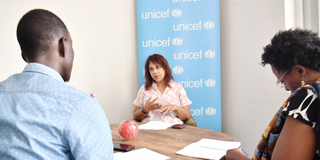Unicef lauds Tanzania on birth registrations

Unicef’s global director for child protection Sheema Sen Gupta (centre) responds to questions during an interview in Dar es Salaam last week. PHOTO | COURTESY
What you need to know:
- Unicef underscores the importance of giving girls opportunities to catch up and ensuring boys are equally part of the solution
Dar es Salaam. The United Nations Children's Fund (Unicef) has commended Tanzania for significant progress in its birth registration system, enhancing children's rights and their unique identities.
The praise was shared by Unicef's Global Director for Child Protection, Ms Sheema Sen Gupta, in a recent interview.
She highlighted the advancements brought about by the Child Act and justice reforms, noting that one of the most impressive achievements is the rise in the number of children being registered at birth.
“Ten years ago, Tanzania's birth registration rates ranged between 10 and 12 percent, but today, it stands at 68 percent. That's massive progress,” said the organisation’s representative, hinting that the goal was to attain 100 percent registration.
She hailed the government for implementing a single, effective registration system: “When we spoke to government officials, including commissioners, we saw their commitment to delivering on child protection.”
She said birth registration is a gateway to rights as it serves as the foundation for a child's access to healthcare, education, and social services. "It is a key right affirmed by the UN Convention on the Rights of the Child, to which Tanzania is a signatory. However, challenges persist in reaching older children who were not registered at birth," she said.
She noted that UNICEF is urging more community outreach to bring these unregistered children into the system.
Justice reform, child protection
Ms Gupta said Unicef’s report also highlights progress in justice reform, stressing that no child should face detention.
“No child should be left behind, particularly those displaced or without birth certificates,” she emphasised.
Juvenile justice reforms, including diversion programs, are being advocated to keep children out of detention and in community-based rehabilitation.
Furthermore, she said Unicef is also taking a strong stance against child marriage, reaffirming that anyone under the age of 18 is a child.
“A 14-year-old is not ready for marriage or motherhood,” the representative said, adding that early marriages deny the girls rights to education and development.
Tackling violence against children
She said Unicef data shows that 400 million children globally experience violence at the hands of carers.
In her clarification, she said in Tanzania, corporal punishment is still legal, but the push for change is gaining momentum.
“Countries are increasingly banning these violent practices, and we hope Tanzania will continue to follow suit,” said the representative. Despite these advancements, Unicef acknowledges challenges in scaling social welfare and justice services due to limited capacity and funding.
Nevertheless, she noted that the number of courts dedicated to child justice in Tanzania has grown from one in 2015 to over 200 today.
Child Protection Strategy 2021-2030
On the strategy, she said Unicef’s child protection strategy, launched in 2021 and aligned with the Sustainable Development Goals (SDGs), focusses on safeguarding children from all forms of violence, including physical, emotional, sexual, and online.
"Recognising the complexities of violence prevention, the organisation aims to address immediate needs while working toward long-term solutions," she said.
The digital frontier: Protecting children online
She said Unicef is also addressing the growing issue of online violence, especially as more children have been exposed to the internet during the Covid-19 pandemic.
According to her, collaborative efforts in 25 countries revealed that at least 20 percent of children have encountered online violence.
"Unicef is working with cybersecurity leaders to develop protective measures to ensure children's safety in the digital space," she said.
Global challenges, local solutions
Furthermore, she said while the focus on birth registration remains strong, UNICEF’s efforts extend to combating child marriage and female genital mutilation (FGM), which remain prevalent in some regions.
According to her, child protection issues are often overlooked by governments, with priorities skewed toward health and education.
In Tanzania, however, UNICEF’s long-standing collaboration with the government has yielded significant progress.
She said the country’s child protection system has evolved since 2008, following a national study on violence against children.
"Today, the system encompasses justice services, social welfare, capacity building, and policy reform aimed at safeguarding children’s rights," she said.
Looking ahead: Equal opportunities for girls, boys
On the International Day of the Girl Child, UNICEF underscores the importance of giving girls opportunities to catch up on what they've lost while ensuring boys are equally part of the solution.
“We must work together to provide all children with the support they need to thrive,” said the representative.
She said UNICEF remains committed to working with governments and global partners to protect children in all aspects of their lives, from birth registration to online safety, ensuring no child is left behind.





